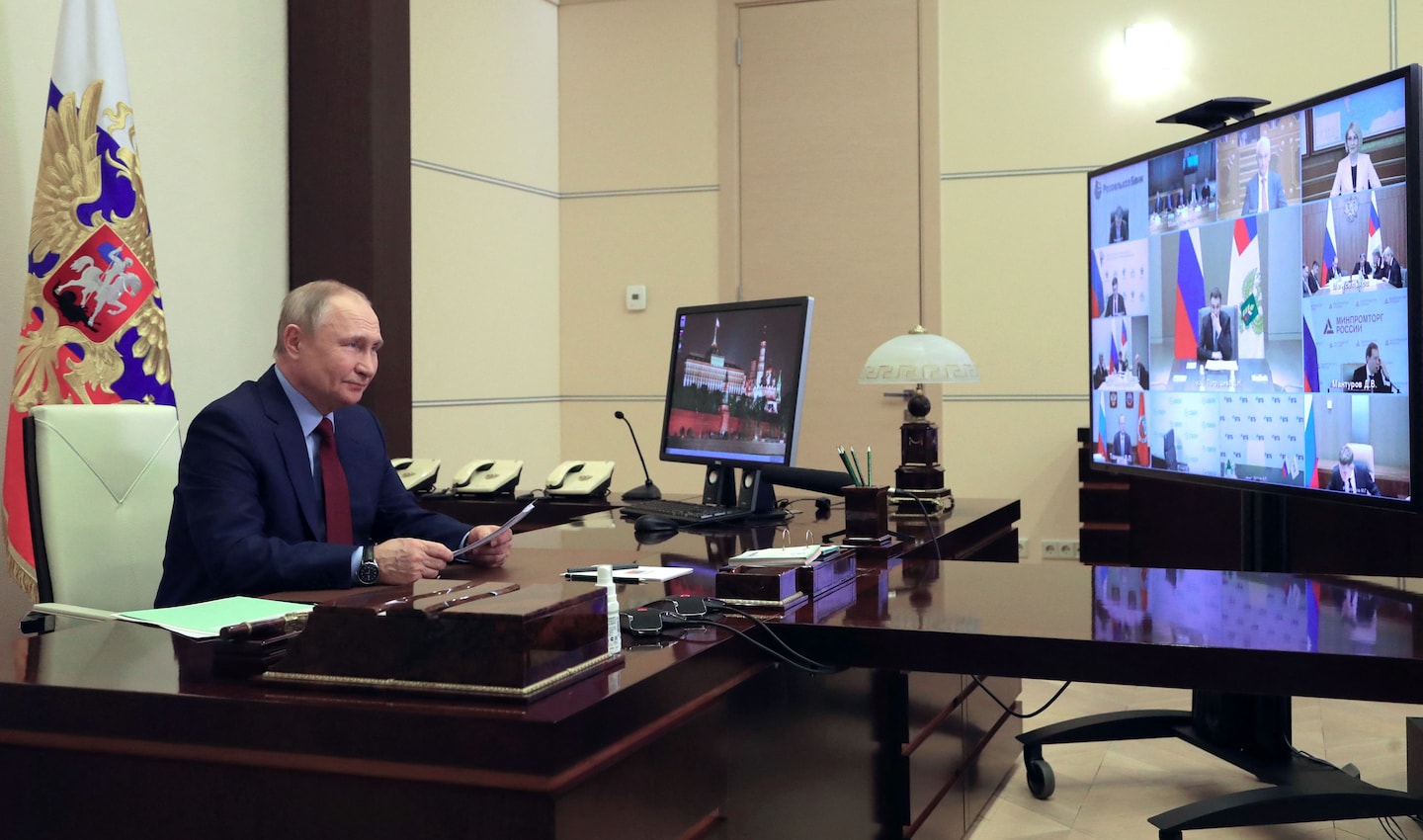The White House on Wednesday announced a new round of sanctions targeting two of Russia’s biggest banks and the adult children of Russian President Vladimir Putin, as the Biden administration seeks to amplify the financial pressure on the Kremlin over the invasion of Ukraine.
U.S. widens sanctions against Russia as questions about effectiveness mount

President Biden detailed the sanctions in a speech to the North America’s Building Trades Unions on Wednesday, accusing Russia of “war crimes” and arguing the measures would further strain its economy.
“We’re going to further increase Russia’s economic isolation,” Biden said. “The United States will continue to stand with the Ukrainian people in their fight for freedom.”
But even as the administration imposes additional sanctions, questions have intensified over the effectiveness of the West’s uneven economic campaign against Moscow.
Russia’s currency initially crashed after the U.S. government and its allies first hit the Kremlin with sanctions several weeks ago. But the ruble has recently recovered and Europe continues to buy billions of dollars worth of Russian oil and gas. This has helped Moscow offset the costs of the war. Although the Biden administration has banned imports of Russian energy to America, the United States has held off on sanctioning international Russian energy transactions amid fears about the impact of higher global energy prices on domestic inflation. Ukrainian President Volodymyr Zelensky has pressed the United States to adopt a number of measures the White House has so far resisted, such as closing international vessels off to Russian ports.
“The measures taken today by the U.S. and E.U. represent a significant tightening of an already tough set of measures. … However, given the nature of the atrocities being committed in Ukraine, it is fair to ask if these measures go far enough,” said Daniel Glaser, who served in the Treasury Department’s Office of Terrorism and Financial Intelligence under the Obama administration and is now the global head of jurisdictional services at K2 Integrity, a risk compliance firm. “Oil and gas remain untouched and Russia continues to have access to the international financial system.”
White House officials have been adamant that the sanctions are working despite these criticisms, pointing to projections that the Russian economy could contract by as much as 15 percent this year — which would be the single biggest decline in the Russian economy since the start of the dissolution of the Soviet Union in 1989. They have also said inflation in Russia has risen at roughly 2 percent a week, which would translate into roughly 200 percent inflation if compounded over a year.
“Anyone who looks at the Russian economy right now and thinks they’re bouncing back or showing some signs of life is I think missing the forests for the trees,” White House National Economic Council Director Brian Deese told reporters Wednesday morning at an event held by the Christian Science Monitor. “They are completely ostracized.”
Additional sanctions on Russia could also add additional strains to the global economy that is still trying to rebound from the coronavirus pandemic.
Russia is not only one of the world’s largest energy suppliers but also plays a crucial role in the supply chains for car parts, food and other commodities. Speaking to congressional lawmakers on Wednesday, Treasury Secretary Janet L. Yellen warned of price increases for energy and food globally as well as devastating impacts on poorer countries less equipped to absorb the blow and more dependent on Russian and Ukrainian wheat exports.
Yellen also suggested Wednesday that the United States may not participate in some meetings at the Group of 20 this year in Indonesia if Russia is in attendance. Deese told reporters that Washington wants Russia expelled from the G-20 but that its economy may contract to such an extent that it no longer qualifies as one of the world’s richest nations.
“Russia’s actions, including the atrocities committed against innocent Ukrainians in Bucha, are reprehensible, represent an unacceptable affront to the rules-based global order, and will have enormous economic repercussions for the world,” Yellen said. “Russia’s invasion disrupted the flow of food for millions of people around the world and caused prices to spike.”
Yellen faced aggressive questions from lawmakers Wednesday, with Rep. David Scott (D-Ga.) demanding an explanation for why some wealthy Russian oligarchs had not yet been targeted. Yellen declined to answer questions about specific individuals but said the administration had put sanctions on many members of Russia’s financial elites and was working to add more.
The latest U.S. measures amount to “strong moves” that for the first time hit Russian state-owned companies and increasingly cut its banking sector off from the global financial system, said Edward Fishman, a former State Department official who worked on Russia sanctions policy during the Obama administration.
“They don’t address the biggest weakness in sanctions: Russia’s continued oil and gas sales, which rake in $1 billion each day for the Kremlin,” Fishman said. “As long as this gap exists, sanctions pressure will face an upper limit.”
Other experts have worried that it is possible that sanctions on Russia are having a counterproductive effect, by making Russian society antagonistic toward the United States and more supportive of Putin.
Putin’s daughters Mariya Putina and Katerina Tikhonova and Lavrov’s wife and daughter are the targets of new sanctions, Secretary of State Antony Blinken said in a statement Wednesday. Blinken said that U.S. officials believe many of Putin’s personal assets are hidden with family members, which is why the Western allies are targeting them.
Putina is a genetics researcher and Tikhonova was once deputy director for the Institute for Mathematical Research of Complex Systems at Moscow State University, according to a 2021 Washington Post article. Russia previously levied sanctions on senior White House officials and Biden’s son, Hunter Biden.
The Wall Street Journal first reported that the sanctions against Putin’s daughters were coming.






